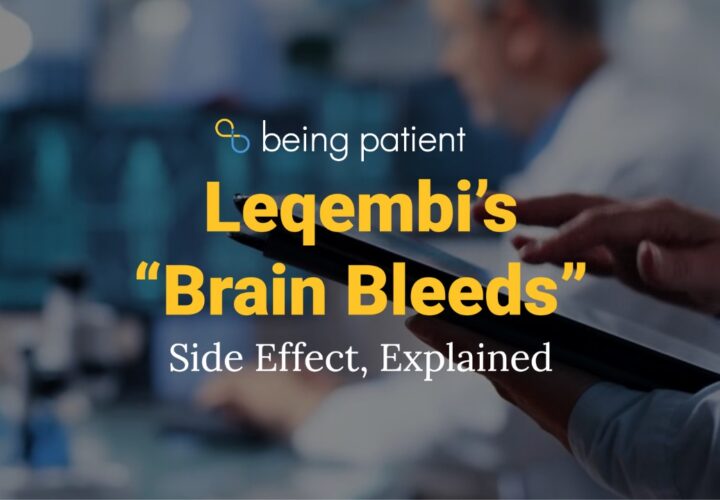Experts explain the side effect known as ARIA — or brain bleeds — associated with a new class of drugs to treat Alzheimer's disease.
Neurologists and Alzheimer’s research experts explain the side effect known as ARIA — or brain bleeds — associated with the use of anti-amyloid monoclonal antibody drugs for Alzheimer’s disease, including discontinued Aduhelm and FDA-approved Leqembi.
Anti amyloid monoclonal antibodies, a groundbreaking new kind of Alzheimer’s treatment. Leqembi or Lecanemab received full traditional FDA approval for use in the U. S. in July 2023. Aduhelm (or aducanumab) gained FDA conditional approval in June, 2021, but was taken off the market in February, 2024. Both drugs are designed to target beta amyloid protein plaques that build up in the brain and may contribute to cognitive decline.
What is ARIA?
Like most drugs, this class of Alzheimer’s drugs comes with a risk of side effects, including one known as ARIA, amyloid related imaging abnormalities.
Most of the time, this side effect doesn’t lead to any symptoms, meaning there are no outward signs of it at all.
There are two types of ARIA, brain swelling or tiny brain bleeds. The risks are significantly higher for carriers of a genetic variant called ApoE4. Sometimes called the Alzheimer’s gene, this variant is associated with higher Alzheimer’s risk.
“The prevailing thought at this moment is that amyloid deposits in the blood vessels called cerebral amyloid angiopathy and APOE4 carriers tend to have more cerebral amyloid angiopathy,” Dr. Marwan Sabbagh, a neurologist at the Barrow Institute, told Being Patient. “And that because you have more amyloid in your blood vessels, when you bind those blood vessels with these monoclonal antibodies, that, or at least the amyloid, you make them leaky. And that’s what’s causing the ARIA.”
According to Sabbagh, for people who do not carry APOE4, the risk of ARIA while on the drug that can be is about 5 percent. If you have a single copy of the gene, that risk rises to 15 percent, two copies, 33 percent.
In rare cases, ARIA can be serious. During Leqembi’s drug trials, at least one of the three patients who died had signs of ARIA in their brains. Donenumab is a new addition to this drug class, still in trials. There have been three deaths of trial participants related to ARIA.
Neurologist Daniel Gibbs, the author of A Tattoo on My Brain, spent 25 years caring for Alzheimer’s patients before he was diagnosed with the disease himself. He’s a carrier of two copies of ApoE4 and experienced ARIA during a clinical trial for the (now discontinued) drug Aduhelm.
“I get headaches not uncommonly, so I didn’t think really anything of it, but they became a little more frequent and perhaps a little more severe,” Gibbs told Being Patient. “I read about two books a week, and I found that my reading speed really slowed down, and I had to use my finger to to kind of follow along words and it got so bad that I couldn’t tell the difference between the letters p, D, and B. The ARIA business didn’t cross my radar at all. And then a night or two before Christmas I had like the worst headache of my life and the kind that we as neurologists would associate with a subarachnoid hemorrhage, massive bleeding to the brain. And I took my blood pressure and it was sky high, something like 220 over 110 and stayed hot.”
Is ARIA dangerous?
Despite experiencing ARIA Gibbs remains a strong proponent of participating in clinical trials.
“ARIA are usually benign,” Gibbs said. “Most people don’t know they have them. They’re only caught on MRI scans where there’ll be little areas of swelling or little tiny areas of iron deposition from bleeding. But if people have symptoms from them, they’re usually mild, a headache is the most common one, occasionally confusion. But for the most part, almost always even with symptomatic ARIA, if you stop the drug, They’ll go away in a few months and actually the drug can be restarted again safely.”
Donanemab is currently in phase 3 clinical trials. The FDA is expected to decide whether or not to approve donanemab in early 2024.
Dr. David Weidman is a principal investigator for two donanemab trials.
“The rate of the watery type ARIA stands for amyloid related imaging abnormality was 6 percent with an enema in terms of causing symptoms, headache, confusion, dizziness,” Weidman told Being Patient. “But we’ve learned over the last 10 or 15 years how to very quickly monitor by holding the dose, letting the edema or water resolve.”
Does donanemab cause side effects?
Weidman says in the beginning of Phase 2 trials, there were no cases of large bleeds.
“There were a couple in the phase two of donanemab which did reverse. there is close monitoring that sometimes needs to be done and a lot of education that if a person has a sudden garbled speech or can’t speak or a numbness on one side within our trials, of course, it would just demand immediate attention from the family,” he added. “But theoretically, this can be a side effect of these drugs. And you can imagine when it’s given to thousands that obviously we’re amplifying that chance.”
While severe ARIA cases are rare, before starting on antiamyloid monoclonal antibody drugs, patients should consult with their doctors about key risk factors. These include age, history of strokes, use of antithrombotic or anticoagulant drugs, and APOE4.




So besides not improving people with Alzheimer’s lives, there is a chance of brain bleed. It seems we need to start over, get a better understanding of the cause of the desease.
Thanks for reading, Doug, and for sharing your thoughts. So many medications do come with side effects, it’s true. We’re keeping a close eye on the space and on the news of the risks and benfits of this new class of drugs. One thing we know is a positive: These anti-amyloids are the first-ever disease-modifying treatments for Alzheimer’s, in the nearly 120 years since the disease was first identified. Drug developers may have a long way to go, but we are hopeful this is the start of a steep curve upward in terms of innovation in new disease-modifying treatments.
There is no definitive cure for Alzheimer’s. If you are told that you have, will
dignitas accept you for assisted suicide?
Joy, thank you for being here. You’ll need to get in touch with Dignitas directly for that information. In the meantime, Kelly Bone is one advocate we’ve interviewed on this topic: https://www.beingpatient.com/death-with-dignity-and-alzheimers-kelly-bone/
I enjoy reading these articles but they are consistently ruined by the ads which block out some of the wording. I do not seem to be able to remove them. What can I do about this?
Brenda, thank you so much for your note — We’re looking into this!!
I’ve been told that I am in the early stages of Alzheimer’s (MCI) and that I should begin Lequembi infusions no later than December of 2024. I’m taking donezepil and memantine. Will they be enough? I’ll be 82 next month and hate to risk the possibility of the side effects of Lequembi as well as the pain of going somewhere every two weeks for two hours for the rest of my life
Hi Carolyn, thank you for being here. We aren’t able to provide medical advice and we recommend speaking with a doctor about your concerns. Your risk of side effects depends on what other medications you might be taking and whether you have the ApoE4 gene. Often, people who experience side effects like ARIA don’t have symptoms and doctors know how to safely pause the drug if people develop it. Wishing you the best of luck as you navigate this journey.